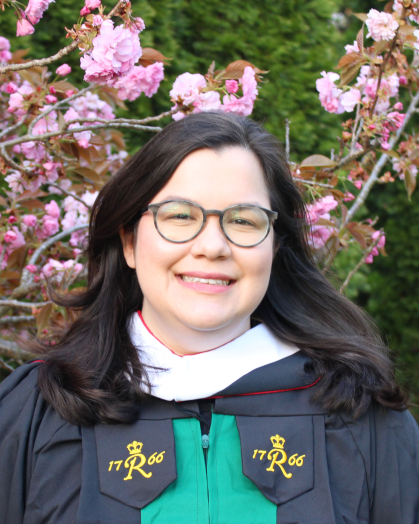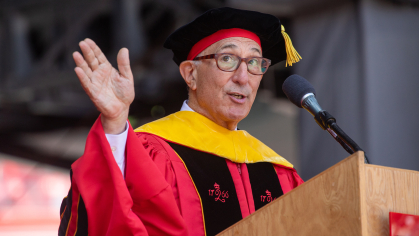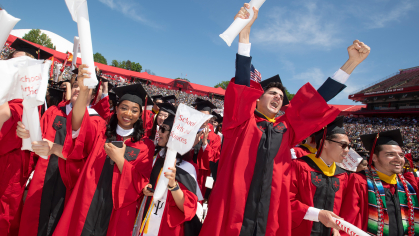Rutgers Graduate Takes Interdisciplinary Approach to Life, Medical Future
Biology major finds her path to education, close-knit communities at Rutgers

When Nadia Fedoryka came to Rutgers four years ago, she wasn’t sure the direction she should take but knew she had time to figure it out.
She loved science but wanted to know what makes individuals tick. Understanding the economy, she thought, would help her in life and whatever career she chose.
So Fedoryka decided to take an interdisciplinary approach to life and school and see where it would take her.
“I realized as soon as I arrived that just because other students completed a track in a certain way did not mean that I had to,” said Fedoryka, who will graduate with a degree in biology from the School of Environmental and Biological Sciences and minors in women’s and gender studies and economics from the School of Arts and Sciences. “It certainly didn’t mean that I couldn’t combine all of my interests to create different ways I can contribute to my community.”
Fedoryka, who will continue working as a medical imaging tech aide at Jefferson Stratford Hospital in Camden County, is studying for the Medical College Admission Test (MCAT) in June and hopes to begin medical school in 2022.
“I'm fortunate that I feel strong in the MCAT categories because of the education that I have had,” she says. “So, luckily, I am not starting from scratch. There's always more you can do, but I’m grateful for the foundation Rutgers gave me.”
Fedoryka thinks the courses she took in both women's and gender studies and economics will help her as she navigates her way toward a career in medicine. While she wants to pursue a dual MBA and MD and thinks it will prepare her for a possible administrative role later on, it is the classes she took in women's and gender studies that broadened her view of biology and the body.
“When I became interested in women’s and gender studies, I loved how different it was than STEM (Science, Technology, Engineering and Math),” the 22-year-old said. “It enhanced my medical education because now I feel better informed, not only about anatomy and physiology but about people and patients themselves. We’re more than just our body. We all have identities that intersect, and that affects health care greatly.”
As part of her thesis project, Fedoryka conducted a review of patients' perspectives of weight bias during pregnancy. She looked at insensitive language used by health care professionals, ambiguity surrounding patient care such as not having access to a correct size hospital gown or blood pressure cuffs, positive patient experiences and assumptions made by health care professionals due to weight status.
“Nadia’s intellect and dedication to scholarly inquiry truly stands out among her fellow students,” said Shari Munch, a professor at the School of Social Work and maternal health expert, who advised Fedoryka on her thesis. “The interdisciplinary approach to her thesis, spanning fields of medicine, social science and history makes her thesis especially unique. Her findings undoubtedly will have implications for future research to better understand the impact of weight bias by health providers during pregnancy. Her work is an excellent addition to the body of knowledge regarding maternal and infant health outcomes.”
Fedoryka began her education at Rutgers as a Douglass Residential College student in the Honors College in New Brunswick. She served as a resident assistant at Douglass until the pandemic led to the economic shutdown, shifted most classes at Rutgers to remote learning and sent her and her sister, another Rutgers student, home to Mantua in Gloucester County.
On the Douglass campus, she embraced the Honors College’s commitment to service. She found a love of mentorship through the College Support Program, a unit of the Rutgers Center for Adult Autism Services. She mentored students for three years and pursued an interest in developmental pediatrics.
Her enthusiasm for Douglass shines through with prospective students. This year, she was the chairperson of the Douglass Student Recruitment Network, a student leadership organization that aids the recruitment of prospective students by planning recruitment events such as Open Houses, Discover Douglass Days, Douglass Receptions and more.
The campus also provided Fedoryka something she didn’t expect of a Big Ten school: a small close-knit community.
“When I applied to college, the one thing I wanted was a small college, but as we know, Rutgers is quite large in size,” she said. “But what I found is that there are so many opportunities to curate and create your own environment. The Honors College and Douglass Residential College gave me that. These were my small communities where I had peer support and direct access to advisers, deans and mentors. It helped me feel supported in the larger Rutgers environment.”


